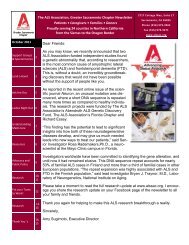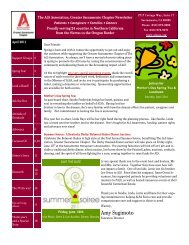Amy Sugimoto - Sacramento - ALS Association
Amy Sugimoto - Sacramento - ALS Association
Amy Sugimoto - Sacramento - ALS Association
Create successful ePaper yourself
Turn your PDF publications into a flip-book with our unique Google optimized e-Paper software.
Research (continued) & Recipe Box<br />
Recipe Box: Breakfast at its BEST!<br />
Baked French Swirl<br />
Contributed by: Leslee DeFazio<br />
Use 3 Qt. baking dish<br />
1 lb loaf of cinnamon bread (cut into cubes)<br />
3/4 cups dried cranberries<br />
3 cups half and half or milk<br />
6 eggs (beaten)<br />
2 tsp vanilla<br />
Refrigerate 1 hour or overnight<br />
Bake at 350 degrees for 45 minutes<br />
Sprinkle with sugar, cinnamon<br />
Serve with butter and syrup<br />
Makes approximately 7-8 servings<br />
Cheesy Sausage Grits<br />
� 16 c. Water<br />
� 4 c. Grits<br />
� 2 Tbsp. Butter<br />
� 1 tsp. Mexican Oregano, ground<br />
� 1/4 tsp. Chile Powder<br />
� 1 1/2 c. Cheddar Cheese, shredded<br />
� 1 package Jimmy Dean® Country Regular<br />
Roll Sausage, cooked, crumbled, drained<br />
� 3 tsp. Parsley, fresh chopped<br />
� 3 tsp. Cilantro, fresh chopped<br />
Directions: Begin by boiling water in<br />
a small pot with the butter. When<br />
water comes to a boil add grits and<br />
stir continuously. When the grits are<br />
cooked add the butter, Mexican oregano,<br />
chili powder, cheese and sausage.<br />
Garnish with parsley and cilantro.<br />
Makes approximately 7-8 servings<br />
Page 8<br />
Misfolded Mutant SOD1 Directly Inhibits Conductance<br />
in Mouse Model<br />
New research uncovers what may be a primary neuron-damaging<br />
insult that occurs in an inherited form of the devastating neurodegenerative<br />
disorder, amyotrophic lateral sclerosis (<strong>ALS</strong>). The mutant<br />
superoxide dismutase (SOD1) protein is one cause of familial<br />
<strong>ALS</strong>. Although mechanisms underlying mutant SOD1 neurotoxicity<br />
remain uncertain, this mutant protein is associated with the<br />
cell’s mitochondria, tiny intracellular energy-producing structures.<br />
Investigators, lead by Professor Don W. Cleveland at the University<br />
of California San Diego, report in the current issue of the<br />
scientific journal Neuron that abnormally folded mutant SOD1<br />
interacts with voltage-dependent anion channel (VDAC1), which<br />
is located in the outer membrane of the mitochondria.<br />
This finding sheds light into possible molecular links between mutant<br />
SOD1 mitochondrial dysfunction and spinal motor neuron<br />
degeneration of inherited <strong>ALS</strong>. This channel controls important<br />
metabolic and energetic functions between the mitochondria and<br />
the rest of the cell. Interestingly, this same channel has been implicated<br />
in Parkinson’s disease where studies have shown that a<br />
protein linked to the disease called Parkin interacts with this<br />
channel.<br />
“Our evidence demonstrates that reduced VDAC1 function and<br />
correspondingly reduced mitochondrial function are direct components<br />
of intracellular damage from mutant SOD1,” says Professor<br />
Cleveland. “The finding that VDAC1 is a target for mutant<br />
SOD1 within the nervous system provides important insight into<br />
the mechanism underlying premature degeneration and death of<br />
motor neurons.”<br />
These studies were performed in the mutant SOD1 rats using<br />
antibodies that specifically recognize the abnormally folded mutant<br />
form of SOD1. Investigators were able to demonstrate a<br />
reduction in conductance through this channel. The channel conductance<br />
was not affected in liver mitochondria, and previous<br />
studies have shown that abnormally folded mutant protein does<br />
not accumulate in liver mitochondria. This suggests that this interaction<br />
only occurs with the abnormally folded mutant protein<br />
in the affected tissues in <strong>ALS</strong>. Chronic mitochondrial dysfunction<br />
can lead to oxidative damage and neuronal degeneration.<br />
“This study builds on earlier findings that mitochondria are critical<br />
players in the disease mechanism; however, the new findings highlight<br />
a novel mechanism and a potential new target for the development<br />
of therapies” commented <strong>ALS</strong> <strong>Association</strong> Chief Scientist<br />
Lucie Bruijn, Ph.D.













